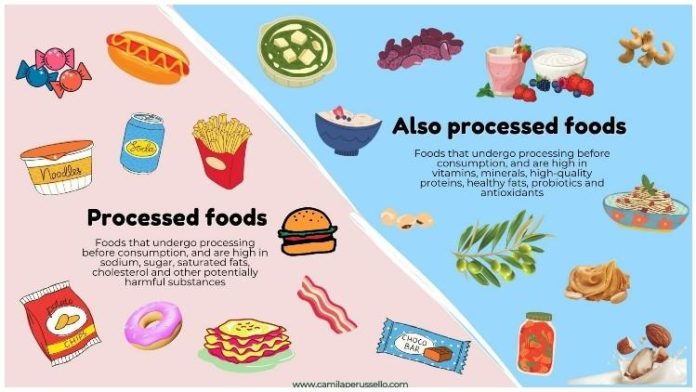In the bustling aisles of modern supermarkets, where vibrant packaging and catchy slogans vie for attention, a quiet debate simmers beneath the surface: should we avoid all processed foods? In an era where convenience often dictates our culinary choices, processed foods have become both a staple of daily life and a source of nutritional controversy. From frozen dinners and breakfast cereals to canned soups and packaged snacks, these foods promise ease and efficiency, yet often come under scrutiny for their health implications. This article delves into the complexities surrounding processed foods, examining the fine line between necessity and indulgence, and explores whether a complete avoidance is truly the path to optimal health or simply a dietary myth. Join us as we navigate the world of processed foods, seeking clarity amidst the confusion, and aiming to uncover the truth behind the labels.
Understanding Processed Foods and Their Role in Modern Diets
In today’s fast-paced world, processed foods have become a staple in many households. These foods, which have been altered from their natural state for convenience, preservation, or flavor enhancement, are often viewed with skepticism. However, not all processed foods are created equal. Understanding their role in our diets can help us make informed choices.
- Convenience: For those with hectic schedules, processed foods offer quick meal solutions, saving valuable time without compromising on basic nutritional needs.
- Affordability: Often, processed foods are more budget-friendly, providing an economical option for families trying to balance healthy eating with financial constraints.
- Safety: Many processed foods undergo pasteurization or other methods to kill harmful bacteria, making them safer for consumption.
While it’s true that some processed foods can be high in sodium, sugar, and unhealthy fats, others, like fortified cereals or canned vegetables, can contribute positively to our nutritional intake. The key lies in understanding labels and making mindful decisions. Moderation, as always, is essential to maintaining a balanced diet.

Nutritional Value: Debunking Myths Around Processed Foods
In today’s fast-paced world, processed foods often receive a bad rap, but it’s crucial to differentiate between the various levels of processing and their nutritional impact. While it’s true that some processed foods can be high in added sugars, unhealthy fats, and sodium, not all are devoid of nutritional value. In fact, many processed foods can be part of a healthy diet. Fortified cereals, for example, are often enriched with essential vitamins and minerals such as iron, folic acid, and B vitamins. Additionally, canned beans and frozen vegetables retain much of their nutritional content, offering convenience without compromising health.
Here are a few common misconceptions about processed foods that deserve to be debunked:
- All processed foods are unhealthy: This is a sweeping generalization. Some processing methods, like pasteurization, enhance food safety and extend shelf life without significantly altering nutritional content.
- Fresh is always better: While fresh foods are great, processed options like frozen fruits and vegetables can sometimes contain more nutrients because they are picked and frozen at peak ripeness.
- Processed means artificial: Many processed foods use natural ingredients and are minimally altered, making them a practical choice for maintaining a balanced diet.
Understanding these nuances can help you make informed decisions and enjoy the convenience of processed foods without unnecessary guilt.

Balancing Act: Incorporating Processed Foods into a Healthy Lifestyle
Finding a middle ground when it comes to processed foods can be challenging, yet essential for maintaining a balanced diet. While whole foods provide the foundation of nutrition, processed foods can offer convenience and, at times, necessary fortification. Instead of viewing processed foods as the enemy, consider the benefits they can bring when chosen wisely. Some processed items are enriched with essential vitamins and minerals, making them valuable additions to your diet.
- Convenience: Ready-to-eat meals and snacks can save time without sacrificing nutritional value.
- Fortification: Foods such as cereals and bread are often fortified with iron, calcium, and B vitamins.
- Preservation: Canned and frozen foods retain nutrients and offer longevity, reducing food waste.
To incorporate processed foods into a healthy lifestyle, focus on reading labels and choosing options with minimal added sugars, sodium, and unhealthy fats. By being selective, you can enjoy the best of both worlds—convenience and nutrition.

Expert Recommendations on Choosing the Right Processed Foods
When navigating the aisles of your local grocery store, it’s essential to make informed choices about processed foods. Experts suggest that while it’s unnecessary to eliminate all processed items from your diet, certain factors can guide your selections. Look for foods with minimal ingredients; products with five or fewer components often indicate less processing. Opt for items that retain nutritional value, such as frozen fruits and vegetables, which can be as nutritious as their fresh counterparts.
- Check for added sugars and sodium: Many processed foods contain high levels of these, so choose those with lower amounts.
- Beware of artificial additives: Try to avoid foods with artificial colors, flavors, and preservatives.
- Prioritize whole grain options: When selecting processed grains, whole grain varieties offer more fiber and nutrients.
- Mind the portion sizes: Pre-packaged foods can lead to overeating, so pay attention to serving sizes.
By following these expert recommendations, you can make better choices that align with a balanced and healthy diet.
To Wrap It Up
In the ever-evolving landscape of nutrition, the debate over processed foods is unlikely to be settled with a simple yes or no. As we navigate the aisles of modern supermarkets, our choices reflect more than just nutritional values; they echo our lifestyle, culture, and personal beliefs. While some processed foods may provide convenience and essential nutrients, others might pose risks that are best approached with caution. The key lies in balance and informed decision-making. By understanding the spectrum of processing and listening to both science and our bodies, we can chart a path that aligns with our health goals and personal preferences. whether you choose to embrace, avoid, or selectively include processed foods, the journey towards mindful eating is yours to define.


































